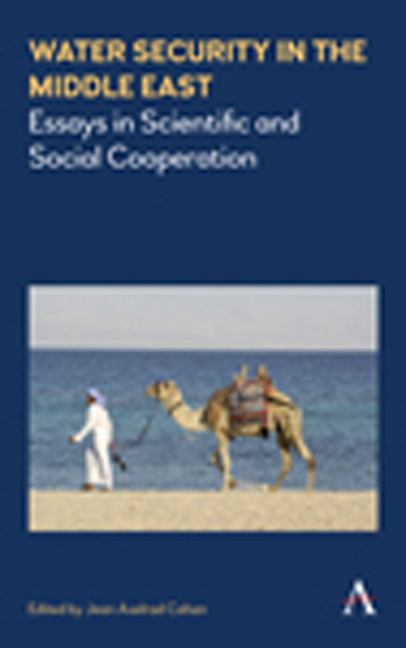Book contents
- Frontmatter
- Contents
- List of Illustrations
- Acknowledgments
- Foreword
- Introduction Water Security in the Middle East: A Role for the Social Sciences and Humanities
- Chapter 1 Cooperation Rules: Insights on Water and Conflict from International Relations
- Chapter 2 Water Security in Transboundary Systems: Cooperation in Intractable Conflicts and the Nile System
- Chapter 3 Water-Demand Management in the Arab Gulf States: Implications for Political Stability
- Chapter 4 A Watershed-Based Approach to Mitigating Transboundary Wastewater Conflicts between Israel and the Palestinian Authority: The Besor-Hebron-Be'er Sheva Watershed
- Chapter 5 The Evolution of Israeli Water Management: The Elusive Search for Environmental Security
- Chapter 6 Adapting to Climatic Variability along International River Basins in the Middle East
- Chapter 7 Water and Politics in the Tigris-Euphrates Basin: Hope for Negative Learning?
- Chapter 8 The Political and Cultural Dimensions of Water Diplomacy in the Middle East
- Notes on Contributors
- Index
Chapter 3 - Water-Demand Management in the Arab Gulf States: Implications for Political Stability
- Frontmatter
- Contents
- List of Illustrations
- Acknowledgments
- Foreword
- Introduction Water Security in the Middle East: A Role for the Social Sciences and Humanities
- Chapter 1 Cooperation Rules: Insights on Water and Conflict from International Relations
- Chapter 2 Water Security in Transboundary Systems: Cooperation in Intractable Conflicts and the Nile System
- Chapter 3 Water-Demand Management in the Arab Gulf States: Implications for Political Stability
- Chapter 4 A Watershed-Based Approach to Mitigating Transboundary Wastewater Conflicts between Israel and the Palestinian Authority: The Besor-Hebron-Be'er Sheva Watershed
- Chapter 5 The Evolution of Israeli Water Management: The Elusive Search for Environmental Security
- Chapter 6 Adapting to Climatic Variability along International River Basins in the Middle East
- Chapter 7 Water and Politics in the Tigris-Euphrates Basin: Hope for Negative Learning?
- Chapter 8 The Political and Cultural Dimensions of Water Diplomacy in the Middle East
- Notes on Contributors
- Index
Summary
The Arabian Peninsula is one region where the terrain, climate and available natural resources have all played an important role in shaping human– environment relations, economic development and population size. Its harsh climatic conditions have historically deterred colonial powers from attempting to control the peninsula, save for the Ottomans, who controlled a coastal strip, a route to Mecca and Medina, and the British, who captured a few port cities. In addition to the Persian Gulf, the Indian Ocean and the Red Sea, the vast and harsh desert that covers much of the interior of the peninsula— extending all the way to the Euphrates River— was a virtual barrier to transportation, making much of the area feel like an island (jazeera in Arabic) to its inhabitants.
While this popular image of the past still lingers, the active exploitation of the hydrocarbon wealth that started in the 1950s has been instrumental in transforming the human– environment relations as well as the socioeconomic base and political organization of the area. For instance, up until the modern development of the 1960s, the water needs of the people of Abu Dhabi were met solely from springs and shallow wells that tap groundwater resources. Water extraction and delivery methods were traditional and labor intensive. “The traditional jazra system, which uses animals to pull water from deep wells, was still in use until a few decades ago” (EAD 2014). Politically, the Gulf states formed the Gulf Cooperation Council (GCC) in 1981, a political institution that is made up of Saudi Arabia, United Arab Emirates (UAE), Qatar, Oman, Bahrain and Kuwait. This political alliance allows the mostly small countries to align many of their energy and foreign policies. In recent years, they have initiated cooperative efforts on water issues. One such effort is the 2013 agreement to jointly build a massive $7 billion desalination plant on the Arabian Sea (the Indian Ocean side), which would avoid potential contamination from either a radioactive spill from Iran's nuclear facilities or an oil spill in the Persian Gulf shipping lanes. Due to the abundance of oil and natural gas, within a few short decades the Gulf states went from pervasive poverty and from being an inconsequential region in the world to having rapidly growing, globally integrated economies that boast world-class infrastructure, and to providing the native population a high standard of living.
- Type
- Chapter
- Information
- Water Security in the Middle EastEssays in Scientific and Social Cooperation, pp. 67 - 92Publisher: Anthem PressPrint publication year: 2017



